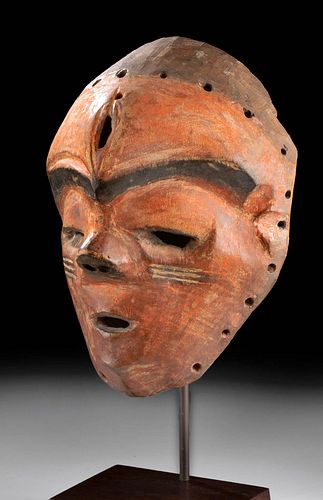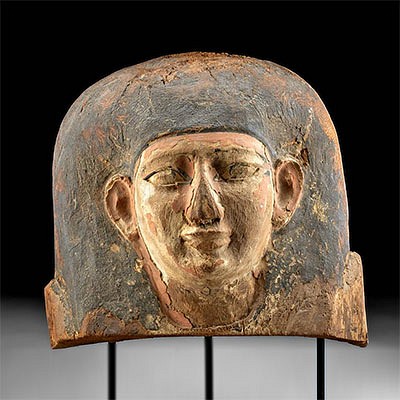20th C. African Pende Painted Wood Mbuya Mask
Lot 145
About Seller
Artemis Gallery
686 S Taylor Ave, Ste 106
Louisville, CO 80027
United States
Selling antiquities, ancient and ethnographic art online since 1993, Artemis Gallery specializes in Classical Antiquities (Egyptian, Greek, Roman, Near Eastern), Asian, Pre-Columbian, African / Tribal / Oceanographic art. Our extensive inventory includes pottery, stone, metal, wood, glass and textil...Read more
Categories
Estimate:
$1,000 - $1,500
Absentee vs Live bid
Two ways to bid:
- Leave a max absentee bid and the platform will bid on your behalf up to your maximum bid during the live auction.
- Bid live during the auction and your bids will be submitted real-time to the auctioneer.
Bid Increments
| Price | Bid Increment |
|---|---|
| $0 | $25 |
| $300 | $50 |
| $1,000 | $100 |
| $2,000 | $250 |
| $5,000 | $500 |
| $10,000 | $1,000 |
| $20,000 | $2,500 |
| $50,000 | $5,000 |
| $100,000 | $10,000 |
| $200,000 | $20,000 |
About Auction
By Artemis Gallery
Aug 27, 2020
Set Reminder
2020-08-27 10:00:00
2020-08-27 10:00:00
America/New_York
Bidsquare
Bidsquare : VARIETY SALE | Antiquities & Ethnographic Art
https://www.bidsquare.com/auctions/artemis-gallery/variety-sale-antiquities-ethnographic-art-5477
Around the world & back in time - be amazed at the treasures you will find. Antiquities from Egypt, Greece, Italy and the Near East, Asian, Pre-Columbian, African / Tribal / Oceanic, Native American, Spanish Colonial, Russian Icons, Fine Art, much more! Artemis Gallery info@artemisgallery.com
Around the world & back in time - be amazed at the treasures you will find. Antiquities from Egypt, Greece, Italy and the Near East, Asian, Pre-Columbian, African / Tribal / Oceanic, Native American, Spanish Colonial, Russian Icons, Fine Art, much more! Artemis Gallery info@artemisgallery.com
- Lot Description
Central Africa, Democratic Republic of the Congo, Pende people, ca. early to mid-20th century CE. A hand-carved wooden mask known as an "mbuya" in the form of an abstract anthropomorphic face. The expressive visage presents with openwork almond-shaped eyes, an upturned nose, a thin mouth, petite ears, and arching brows, all beneath a rounded forehead with a central vertical slit. Two trios of incised striations along the cheeks are perhaps indicative of ritual scarification. Dozens of petite perforations used for attaching a raffia wig line the periphery, and the obverse is painted with matte brown and orange-red pigment. Mbuya masks are used during dance festivals that celebrate the end of the "mukanda," the male circumcision rituals. A fine example from central Africa! Size: 6.4" W x 8.875" H (16.3 cm x 22.5 cm); 12.5" H (31.8 cm) on included custom stand.
For a stylistically similar example, please see The Metropolitan Museum of Art, accession number 1979.206.273: https://www.metmuseum.org/art/collection/search/312467
Provenance: private New York, New York, USA collection; ex-private New York, New York, USA collection
All items legal to buy/sell under U.S. Statute covering cultural patrimony Code 2600, CHAPTER 14, and are guaranteed to be as described or your money back.
A Certificate of Authenticity will accompany all winning bids.
We ship worldwide and handle all shipping in-house for your convenience.
#149209Chips and abrasions to areas of nose, face, brow, and peripheries, with fading to original pigmentation, and minor softening to some incised details. Light earthen deposits, nice patina, and great traces of original pigment throughout.Condition
- Shipping Info
-
All shipping is handled in-house for your convenience. Your invoice from Artemis Gallery will include shipping calculation instructions. If in doubt, please inquire BEFORE bidding for estimated shipping costs for individual items.
-
- Buyer's Premium



 EUR
EUR CAD
CAD AUD
AUD GBP
GBP MXN
MXN HKD
HKD CNY
CNY MYR
MYR SEK
SEK SGD
SGD CHF
CHF THB
THB














